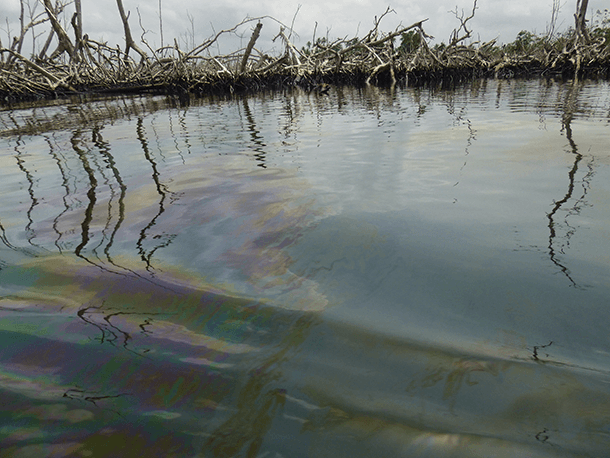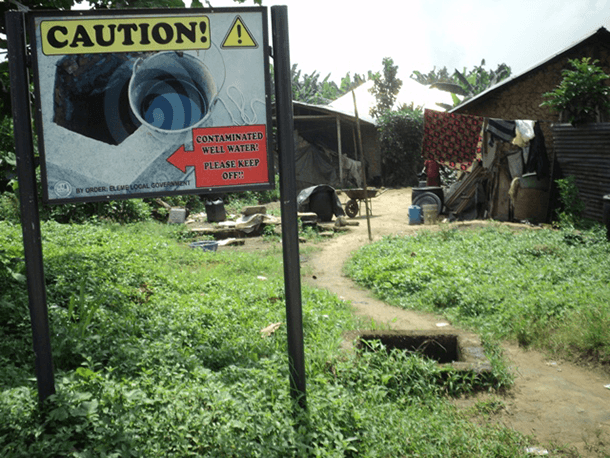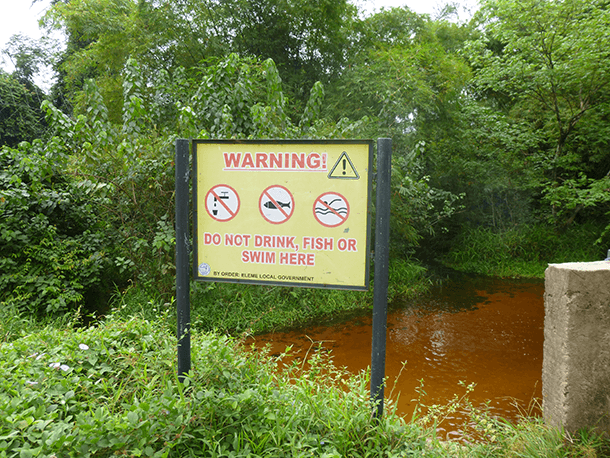Shell Oil faces a lawsuit in the UK over oil spills in Nigeria
Oil companies have left a grim legacy of pollution in Ogale, Nigeria: waterways so polluted that it’s not safe to swim in — let alone drink — the water.
In parts of Nigeria, signs abound warning residents not to drink, swim or fish in the local waterways. Other signs warn residents to avoid drinking their own well water.
Countless oil spills over decades have destroyed fishing and farmland, and turned the once beautiful Niger Delta into a toxic wasteland.
Nevertheless, the large oil companies that extract the oil rarely, if ever, clean up the spills they leave behind. And in places like Nigeria, where the justice system is corrupt and inefficient, using the courts to force the companies to clean up is next to impossible.
Now a new suit has been filed against the Dutch company Shell Oil over its environmental record in the Niger Delta. But this time the suit has been brought in the Netherlands and the UK, where the parent company of Shell Nigeria is registered.
Daniel Leader, of the UK law firm Leigh Day, says the plaintiffs took the case to the British courts for the simple reason that they cannot get justice through the Nigerian system.
“There is no mechanism [in Nigeria] which will allow for group claims on behalf of many thousands of people who’ve been affected by oil spills,” Leader explains. “There's not a chance that Shell would be forced to clean up. They would tie the case up in technicalities. It would take 20 years to get through the system, they would argue every point. [That’s] the kind of thing that they can't do in the [UK] legal system.”
Leigh Day has successfully used this legal strategy before. In early 2015, Shell Oil agreed to pay a £55 million compensation package to residents of the Bodo community who had endured two large oil spills in 2008.
Now two other communities have filed suit: the Ogali and the Bille, from the town of Port Harcourt, near the oil hub in southern Nigeria. Leader represents the Ogali community.
“In essence, the complaint of the Ogali community is that they've suffered from 40 different spills over the last 23 years, and that every aspect of their community is polluted. …. They want Shell to clean up their oil,” Leader says.
According to Leader, the Niger Delta has suffered the equivalent of the Exxon Valdez disaster every year for the last 50 years. “Something like 13 million barrels of oil have spilt into the environment in the Niger Delta — and it's a problem that seems to be getting worse, not better,” Leader says.

Shell is not the only company extracting oil in the region. The Nigerian government operates a joint venture with several companies in which it is the majority shareholder. The joint venture owns the assets, the pipelines and the oil wells, but the industry partners operate the equipment, Leader explains. And the law is clear, he contends: If an oil spill comes from a pipeline owned by a particular company, that company is responsible for cleaning it up.
“It's the ‘polluter pays’ principle and the ‘polluter cleans up’ principle,” Leader says. “So we are simply asking Shell to do what they are required to do under Nigerian law.”
In 2011, the United Nations Environmental Program released a detailed report into pollution in Ogoni land in the Niger Delta area and found “catastrophic levels of pollution” in the surrounding communities, Leader points out. In some cases, emergency water had to be shipped in, because residents were drinking from poisoned wells.

The United Nations advocated a comprehensive cleanup of these communities and pushed for an agreement between the oil companies and the Nigerian government. Since then, no one has cleaned up any oil, Leader says.
“The communities continue to live in these horrifically polluted environments,” he says. “And I understand that Ban-Ki Moon personally wrote to the Nigerian president on several occasions insisting that he do something about this — and still nothing.”
“Ultimately, no one wants to stump up the cash that it's going to take for the cleanup of these communities,” Leader continues. “There’s just simply not the political will, and the oil communities don't want to pay for it, either.”
But these communities don’t need an “overarching political process” to resolve the issue, Leader insists. “It's been five years. So, our clients are saying, ‘This is the law, these are our communities that are being destroyed by your oil. Clean it up.’”
This article is based on an interview that aired on PRI's Living on Earth with Steve Curwood
